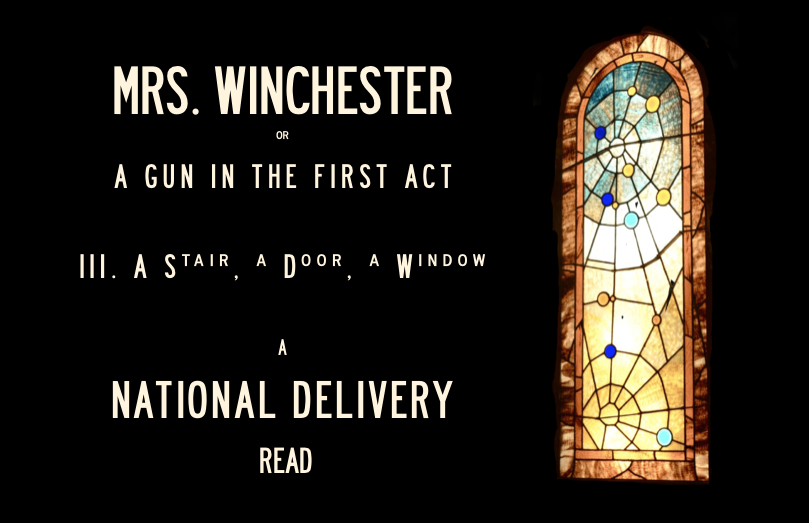Mrs. Winchester III. A Stair, a Door, a Window

There are forty stairways in the house; this is one: thirteen steps that terminate… at the ceiling.
You might think it a stairway that leads nowhere.
You might think it for those unimpeded by physical barriers.
You might think it a joke.
Or, if you climb the stairs and find yourself crouching and crouching and crouching as you approach the end, you might… think.
Curiously, the people who presume this a “stairway to nowhere” nonetheless have the urge to climb it.
“Ho, ho,” said an early visitor, a railroad tycoon whom I shall not name, “How absurd”!
He handed me his highball, and took the first step. He stopped there. Instead of advancing further, he back-stepped, and appeared pale.
“Call me a fool, but I fear it’s bad luck”.
Some years later, another visitor - a writer I greatly admired - gasped when she saw it. She began to climb, on hands and knees. When she could advance no more, she turned about, sat down on a step, and sobbed.
One hot August day, there appeared on the property a Franciscan brother, riding atop a burro. Both were in need of water.
As we wound our way to the kitchen, Brother Francis, I believe it was, stopped here, at the foot of the stair, and looked up. “Not even in Dante,” he said, “Is there a more perfect vision of Hell”.
My favorite response came from a Chinese carpenter. A fellow builder had been introducing him to the… uniqueness… of the house. “This here is the climb to nowhere”! He laughed. Loudly. And alone.
The Chinese man shook his head. He climbed halfway up, his slippers whispering against the wood. He turned about and looked as happy as if he had just completed a long journey.
“No nowheres,” he said, “Only somewheres”.
There are two-thousand doors in the house; this is one: a solid, cedar door of standard Victorian design that opens onto… air. A few stories below is the garden, full of rhododendrons, bougainvillea, and rocks. Not the worst place to end up, should one decide to cross the threshold.
People are surprised when they see it. I think it more surprising that all houses of sufficient height do not have such a door.
It is the first door I had installed in the house, thus something of a favorite.
I begin most days right here. I smell the garden, listen to the birds herald the day, feel the relentless warmth of our California sun on my pale, New Englander’s face.
I clear my mind, and try, simply, to feel. Feel life. Feel a part of life. Feel… alive.
It took me some time to succeed at that.
A little robin sometimes swoops in and lands near my feet, searching for crumbs. My grandmother once told me that a bird in the house augers death. But my little robin friend, so full of life, augurs the opposite. When she hops past my feet and again takes flight, I gratefully close the door, and get on with my day.
There are ten thousand windows in the house. This is one. A personal design in stained glass, executed by a local craftsman - a single panel that features two conjoined spiderwebs supporting thirteen blue-and-gold circular bodies.
Most people look out a window, or through a window, but not into a window.
The year everybody died, I went to Europe. And in Europe, you could find me in church. Not during services, no, I wanted a church all to myself. I wanted its windows. The windows in a church don’t look out onto the town, or the country, or any pleasing vista; they depict. They show people on their knees. In loss. In suffering. In despair. Those were my people. And illuminating their suffering, and despair, and yearning, was the light available at that moment. Not only the light of a bright dawn or glorious sunset, but the light of a gray day, or twilight, or the light of night - the last graspable light for those in darkness.
I placed this window not where it would receive the most light, but the least. For if these strange little globes embedded in a web beyond their understanding could be illuminated, even in the dimmest light, then perhaps there was hope. Or just acknowledgement. Which is enough..
From Mrs. Winchester, or, A Gun in the First Act by Joe Christiano
Next: The Kitchen